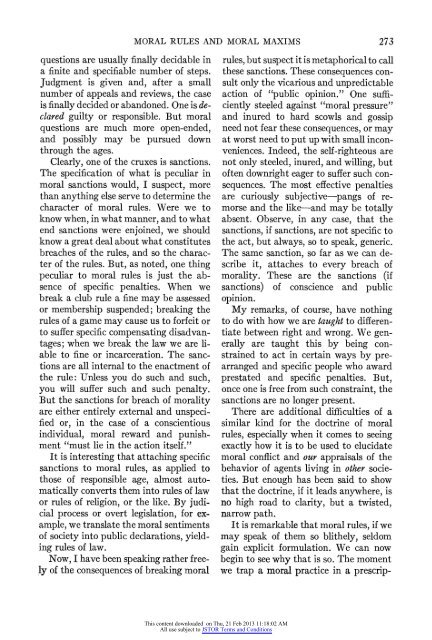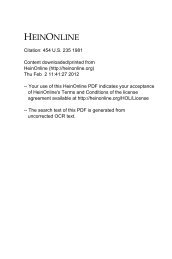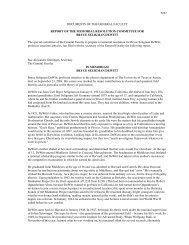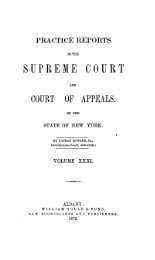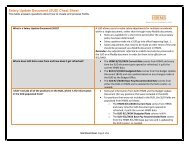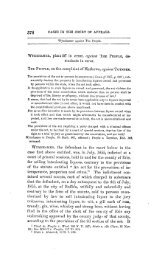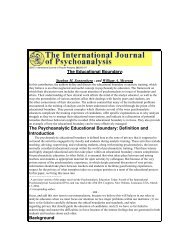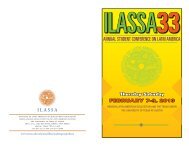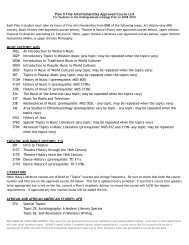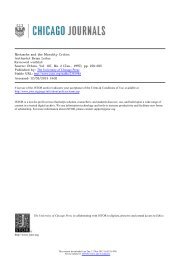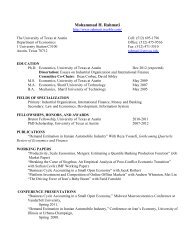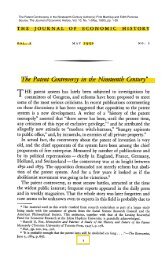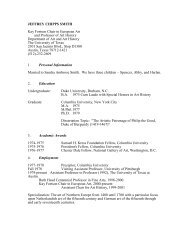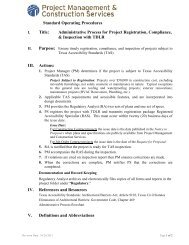Moral Rules and Moral Maxims - The University of Texas at Austin
Moral Rules and Moral Maxims - The University of Texas at Austin
Moral Rules and Moral Maxims - The University of Texas at Austin
You also want an ePaper? Increase the reach of your titles
YUMPU automatically turns print PDFs into web optimized ePapers that Google loves.
questions are usually finally decidable ina finite <strong>and</strong> specifiable number <strong>of</strong> steps.Judgment is given <strong>and</strong>, after a smallnumber <strong>of</strong> appeals <strong>and</strong> reviews, the caseis finally decided or ab<strong>and</strong>oned. One is declaredguilty or responsible. But moralquestions are much more open-ended,<strong>and</strong> possibly may be pursued downthrough the ages.Clearly, one <strong>of</strong> the cruxes is sanctions.<strong>The</strong> specific<strong>at</strong>ion <strong>of</strong> wh<strong>at</strong> is peculiar inmoral sanctions would, I suspect, morethan anything else serve to determine thecharacter <strong>of</strong> moral rules. Were we toknow when, in wh<strong>at</strong> manner, <strong>and</strong> to wh<strong>at</strong>end sanctions were enjoined, we shouldknow a gre<strong>at</strong> deal about wh<strong>at</strong> constitutesbreaches <strong>of</strong> the rules, <strong>and</strong> so the character<strong>of</strong> the rules. But, as noted, one thingpeculiar to moral rules is just the absence<strong>of</strong> specific penalties. When webreak a club rule a fine may be assessedor membership suspended; breaking therules <strong>of</strong> a game may cause us to forfeit orto suffer specific compens<strong>at</strong>ing disadvantages;when we break the law we are liableto fine or incarcer<strong>at</strong>ion. <strong>The</strong> sanctionsare all internal to the enactment <strong>of</strong>the rule: Unless you do such <strong>and</strong> such,you will suffer such <strong>and</strong> such penalty.But the sanctions for breach <strong>of</strong> moralityare either entirely external <strong>and</strong> unspecifiedor, in the case <strong>of</strong> a conscientiousindividual, moral reward <strong>and</strong> punishment"must lie in the action itself."It is interesting th<strong>at</strong> <strong>at</strong>taching specificsanctions to moral rules, as applied tothose <strong>of</strong> responsible age, almost autom<strong>at</strong>icallyconverts them into rules <strong>of</strong> lawor rules <strong>of</strong> religion, or the like. By judicialprocess or overt legisl<strong>at</strong>ion, for example,we transl<strong>at</strong>e the moral sentiments<strong>of</strong> society into public declar<strong>at</strong>ions, yieldingrules <strong>of</strong> law.Now, I have been speaking r<strong>at</strong>her freely<strong>of</strong> the consequences <strong>of</strong> breaking moralMORAL RULES AND MORAL MAXIMS 273rules, but suspect it is metaphorical to callthese sanctions. <strong>The</strong>se consequences consultonly the vicarious <strong>and</strong> unpredictableaction <strong>of</strong> "public opinion." One sufficientlysteeled against "moral pressure"<strong>and</strong> inured to hard scowls <strong>and</strong> gossipneed not fear these consequences, or may<strong>at</strong> worst need to put up with small inconveniences.Indeed, the self-righteous arenot only steeled, inured, <strong>and</strong> willing, but<strong>of</strong>ten downright eager to suffer such consequences.<strong>The</strong> most effective penaltiesare curiously subjective-pangs <strong>of</strong> remorse<strong>and</strong> the like-<strong>and</strong> may be totallyabsent. Observe, in any case, th<strong>at</strong> thesanctions, if sanctions, are not specific tothe act, but always, so to speak, generic.<strong>The</strong> same sanction, so far as we can describeit, <strong>at</strong>taches to every breach <strong>of</strong>morality. <strong>The</strong>se are the sanctions (ifsanctions) <strong>of</strong> conscience <strong>and</strong> publicopinion.My remarks, <strong>of</strong> course, have nothingto do with how we are taught to differenti<strong>at</strong>ebetween right <strong>and</strong> wrong. We generallyare taught this by being constrainedto act in certain ways by prearranged<strong>and</strong> specific people who awardprest<strong>at</strong>ed <strong>and</strong> specific penalties. But,once one is free from such constraint, thesanctions are no longer present.<strong>The</strong>re are additional difficulties <strong>of</strong> asimilar kind for the doctrine <strong>of</strong> moralrules, especially when it comes to seeingexactly how it is to be used to elucid<strong>at</strong>emoral conflict <strong>and</strong> our appraisals <strong>of</strong> thebehavior <strong>of</strong> agents living in other societies.But enough has been said to showth<strong>at</strong> the doctrine, if it leads anywhere, isno high road to clarity, but a twisted,narrow p<strong>at</strong>h.It is remarkable th<strong>at</strong> moral rules, if wemay speak <strong>of</strong> them so blithely, seldomgain explicit formul<strong>at</strong>ion. We can nowbegin to see why th<strong>at</strong> is so. <strong>The</strong> momentwe trap a moral practice in a prescrip-This content downloaded on Thu, 21 Feb 2013 11:18:02 AMAll use subject to JSTOR Terms <strong>and</strong> Conditions


